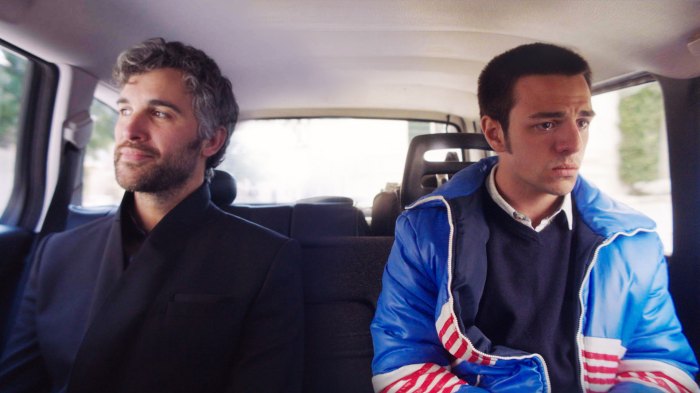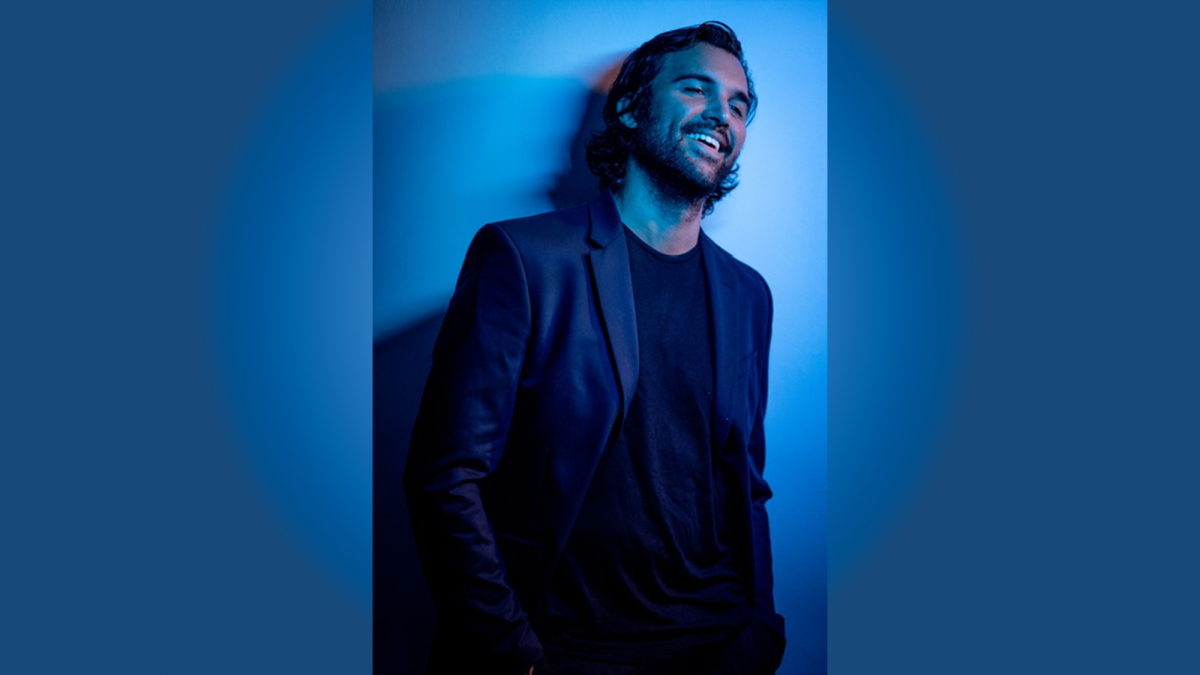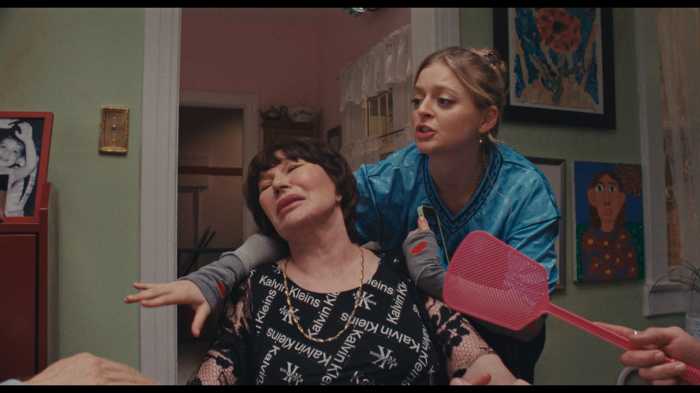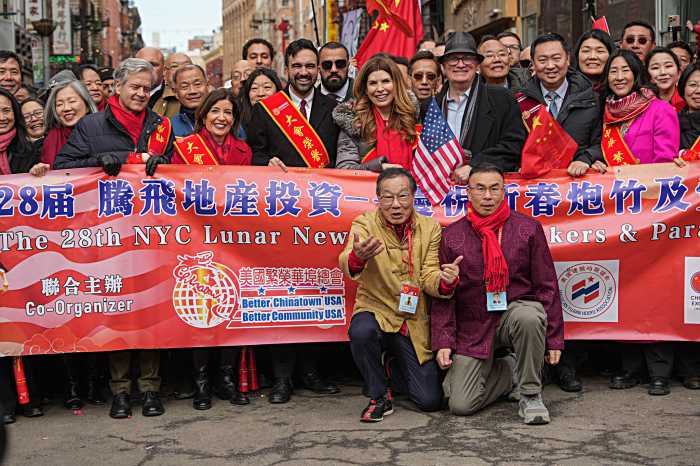The out singer, dancer, actor — and now writer/director — Juan Pablo Di Pace is coming to New York to unveil both his new one-man show, “Juan Pablo Di Pace Live!” accompanied by Michael Orland at 54 Below October 4 and 5, and “Duino,” his debut film as a writer/director, at NewFest, on October 12. (The film will also be available virtually from October 10-22.)
The Argentine Di Pace has had a long career on both stage and screen, performing in Europe in “Chicago” and starring as Tony Manero in “Saturday Night Fever” in Spain. He also has appeared in films including “Mamma Mia!” and the recent queer comedy-drama “The Mattachine Family,” as well as on TV in “Dallas” and “Fuller House.”
Di Pace draws his musical performance from Broadway songs he loves and other sources for “Duino,” (which he made with Andrés Pepe Estrada), his emotional, semi-autobiographical film. This sensitive and absorbing drama depicts the intimate friendship that develops between two teens — the shy Argentine Matias (Santiago Madrussan) and the extroverted Swede, Alexander (Oscar Morgan) — who meet at the United World College of the Adriatic in Duino, Italy in the 1990s. Decades later, the adult Matias (Di Pace) struggles to edit a film he has made about his unfinished experiences with Alexander when he gets the opportunity to reunite with the man who got away.
Di Pace spoke with Gay City News about his musical performance and his fabulous new film, “Duino.”

What can folks expect from your Below 54 show?
This is the third time that I’m in New York doing a one-man show. Every time I get to perform in New York is an absolute gift. I was a musical theater kid; that was my very first career. That was going to be my path — I was going to be a triple threat: acting, singing, dancing — and then I decided to go to America. I had a dream to work in Hollywood. I left everything in Spain [where Di Pace was working] and came to the States. In the States, I’ve had the chance to work in film and television, so New York is a link to the beginning of my career — musical theater. It is a chance to reconnect with that musical part of me. I get to sing songs I love, tell stories, be a bit of a hoofer. I am an admirer of Elaine Stritch, who was such an amazing storyteller. I love taking the audience through things that are emotional; you make them laugh, give them pizzaz, and break their heart. I love that aspect of a live, musical, one-person show.
How do you connect to the music? What is it about a song in particular and American music or musicals in general that appeals to you?
My taste is super eclectic. That is how I built this show. It has no logic. It’s not one vibe. I go from ABBA and the Bee Gees to Kander and Ebb and Sondheim, to some originals. It’s about what I thought learning that song, or listening to that song, or a song I wrote, or a song I always wanted to sing but never had the courage to sing, like “Being Alive.” I discovered Bernadette Peters watching her 1996 London concert. I always had respect for “Being Alive” because of that. Then 25 years later, I got invited to perform at a gala honoring Bernadette Peters and got to sing “Being Alive” to her. That is something you can’t anticipate ever in life. I get to explain those moments. You want to give a song the power and attention it deserves. I like gutsy musicals. One of my favorite writers is Sondheim, who couldn’t be more amazing and clever in how he was able to build and change and shapeshift the music. Every show he did was different. It wasn’t just about lyrics. My relationship with musicals is all very emotional. I like darker musicals, and songs like Kander and Ebb’s “Her Name is Aurora,” and “She’s a Woman,” from “Kiss of the Spiderwoman.” That is my favorite show of theirs because it is connected to my culture and my country.
Do you have plans to record an album or Broadway aspirations?
Of course, I’m always playing with the idea. I have released singles and EPs. The musical thing is something I always keep with me.
Let’s talk about “Duino.” How did that film come about?
“Duino” is based on something that happened in my life. It was not that I wanted to make an autobiographical film, but I wanted to talk about characters and people and situations that I knew very, very well. I codirected it with Andrés Pepe Estrada, my best friend from high school in Argentina. My mother was the production and costume designer. My dad was transport and executive producer. When you are the boss of your parents it is very strange! “Duino” was a masters course in filmmaking. As an actor, I didn’t know much about camera angles and the rules of filmmaking. Andrés was my guide. He edited “Argentina 1985,” which was nominated for an Oscar. We used to say “cheesy control” — as in any time I had an idea that was on the schmaltzy side, Andrés was the police. I love him for that. It was a great collaboration.
What can you say about wanting to direct?
Bob Fosse is like my number one inspiration as a film director. I love everything that is choreographic on film. Not just dance. But when you have been a dancer, you see the world with rhythm and choreography. With “Duino” I tried to do that quite a bit. There were a lot of scenes we shot “on the shoulder” to show memories in 1997. When we edited, we had this fluid material that was dancing between the characters. When you take that a level up to musical film, there is a richness to what you can do with the genre.
Can you talk about making the personal in “Duino” universal? It is a very affecting film.
We’ve all been obsessed with that one person, and fallen in love for the first time with someone, and we all have parents that try to do their best. Those are universal themes. Andrés and I really wanted to explore that. It’s about queer characters, but it is not really a “gay” film per se because there is no [overt] sexuality or making out. There is repression in every family — not necessarily gay repression. We’ve all lusted after someone. What I am proud of is that it was opening a Pandora’s Box for me. When it comes to my filmmaking, I try to be brutally honest. It’s one thing as an actor to interpret a character from an existing script with a director who has a vision. In that case, my job is to give life to the character, and it will be edited in the way they want to edit it. But when you write and tell a story, I’m going to be as truthful and authentic as possible to that story. It was uncomfortable to write and be that honest. Even if you do not have the exact same experience, “Duino” is trying not to be as autobiographical as possible, but as honest as possible. It’s fictionalized.
Matias overthinks things and he may be too close to the film he’s making about his life, and perhaps there’s some imposter syndrome at play here. Did you overthink things making “Duino”?
Call me incredibly melancholic, but I do see life as a series of scenes. That’s why I am a filmmaker. I tend to see even negative experiences as a film. So, to have something powerful and unfinished happen to Matias in his teenage years, as a 40-year-old, he has kept that in amber. I love that concept so much. He is playing with something that has already happened. But you don’t want it to change because the memory is powerful, precious, and perfect — because you are so scared of that memory changing if you see that person again. It is about enjoying memory as it is. With “Duino,” I am interested in what the characters are feeling and thinking rather than what they say.
“Juan Pablo Di Pace Live!” | 54 Below, 254 W 54th Street, October 4-5 at 7:00 pm.
“Duino” | New Fest | October 12 | 6:00 pm | SVA Theater





































